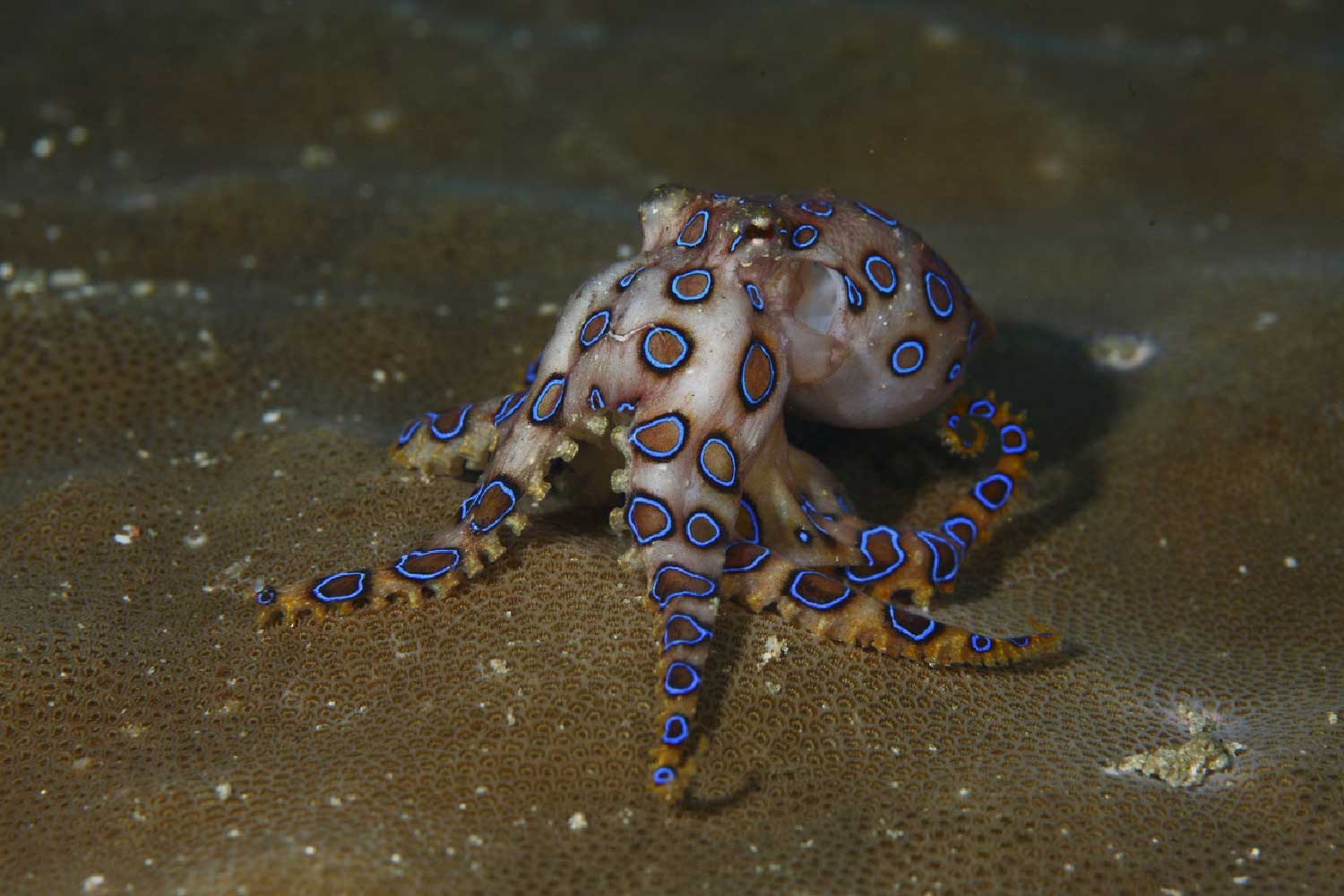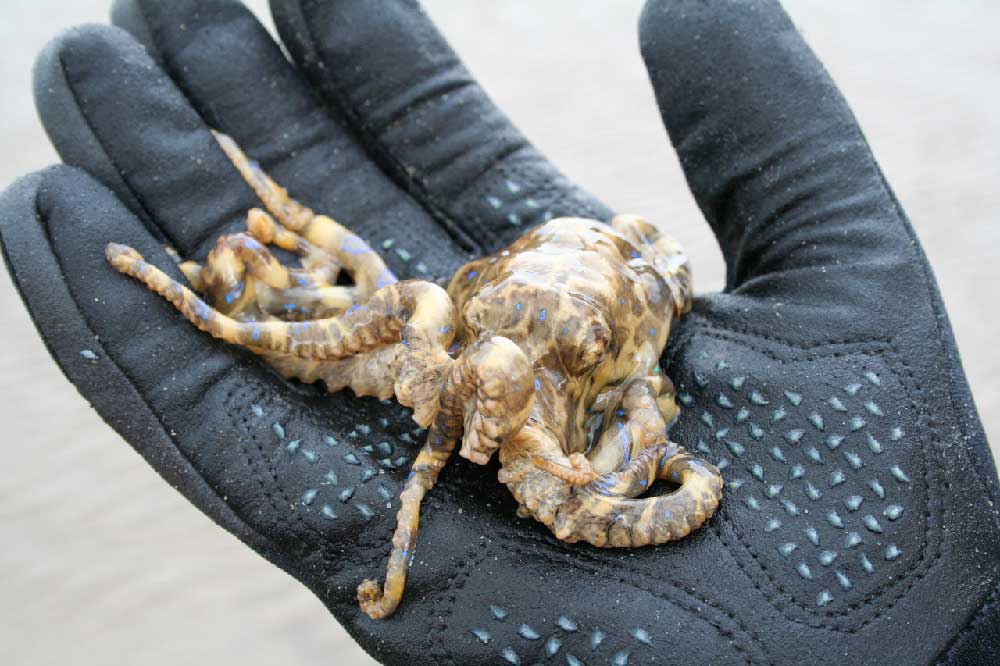Urgent warning: “Multiple” blue ringed octopus reports at Balmoral. Here’s what to do if you are bitten.

Mosman Council has issued an urgent warning for swimmers to be aware of blue ringed octopuses on local beaches.
By ANNA USHER
Swimmers at Balmoral Beach have been warned to watch out for blue-ringed octopuses after several bites were reported.
Mosman Council confirms multiple bites have been recorded in local waters over the last week.

Swimmers are advised not to pick up shells, and to be careful in tidal pools.
The blue-ringed octopus is one of the most venomous animals in the world.
If bitten, the venom can cause paralysis and asphyxiation.
“Council was notified by Royal North Shore Hospital that several cases had occurred, to allow Council to provide information to the community to raise awareness about taking care in these areas,” a spokesperson for Mosman Council said.

Symptoms from a blue-ringed octopus bite include a painless mark with a spot of blood visible.
Blue-ringed octopuses live in tidal pools and reefs around Australia.
The blue colour only becomes easily visible when they are threatened, so by the time a person recognises the creature as a blue-ringed octopus, it may be too late.
Most of the time, they just look like regular brown octopuses.
They grow to a maximum size of 20 centimetres outstretched and weigh about 100 grams.

A blue-ringed octopus bite can paralyse a human in minutes, even causing death.
Symptoms from a blue-ringed octopus bite include a painless mark with a spot of blood visible; numbness around the mouth, lips and tongue; muscle weakness, and difficulty breathing.
Following the Mosman bite cases, community members are reminded to be aware and take care, particularly around rocky tidal areas.
Taxonomist Doctor Amanda Reid said while many octopuses release a toxin, the blue-ringed octopus is a stand-out.
“They’re not different to any other octopuses. Where they do differ is that they’ve got a very powerful poison called tetrodotoxin poison which means that they’ve got a very fatal bite,” Dr Reid said.
“They can inject poison into their prey.”

Symptoms of a blue-ringed octopus bite will progress rapidly in about 10 minutes.
Get The Latest News!
Don’t miss our top stories delivered FREE each Friday.
New South Wales ambulance inspector Christian Holmes said the creature will strike only if threatened.
“If a blue-ringed octopus does bite you, you need to get medical treatment immediately because their bites can be fatal in a short amount of time,” he said.
What you need to know about blue-ringed octopus venom
The blue-ringed octopus has venom called tetrodotoxin, or TTX. This is one of the most serious and deadly types of venom found in the ocean. The octopi’s salivary glands produce the venom, and the bacteria gets dispersed through their beak.
TTX can paralyze a human in minutes. Due to this paralysis, your body wouldn’t be able to get enough oxygen, and death from a blue-ringed octopus would occur.

Swimmers at Balmoral are urged to take care while in the water.
Blue-ringed octopus bite symptoms
You might experience a range of symptoms if a blue-ringed octopus bites you. You may not actually feel the bite itself, but it’s imperative to get medical treatment right away if you suspect it occurred.
Your symptoms may depend on the amount of venom released in your body, as well as your age and overall health.
Symptoms of a blue-ringed octopus bite will progress rapidly in about 10 minutes.
Early symptoms of a blue-ringed octopus bite may include:
- Excessive saliva production
- Difficulty swallowing
- Chest tightness
- Tingling
- Numbness
- Sweating
- Lightheadedness and dizziness
- Headache
- Nausea
- Loss of vision
Symptoms can quickly get worse, escalating to:
- Paralysis
- Weakness in your muscles
- Lack of coordination
- Lack of oxygen in your tissues, resulting in discoloration that appears as blue or purple

The blue-ringed octopus is one of the most venomous creates in the world.
Emergency treatment
You should seek immediate medical attention if you’re bitten, even if you don’t suspect that the creature injected you with venom. There’s no antivenom for a blue-ringed octopus bite.
Venom from a blue-ringed octopus may cause respiratory depression or cardiac arrest. In this case, resuscitation efforts will be initiated by a medical professional.
You’ll also want to care for the wound site. This involves cleaning the bite area with fresh water (not salt water). You should apply the pressure immobilization technique to the wound after it’s cleaned.
This involves wrapping an elastic bandage wrap (ACE bandage) over the wound site, then continuing to wrap it around the rest of that body part very tightly. Complete the treatment by splinting he wrapped area with something stable.
GOT A NEWS TIP? GET IN TOUCH!
Email: [email protected]
Get The Latest News!
Don’t miss our top stories delivered FREE each Friday.










